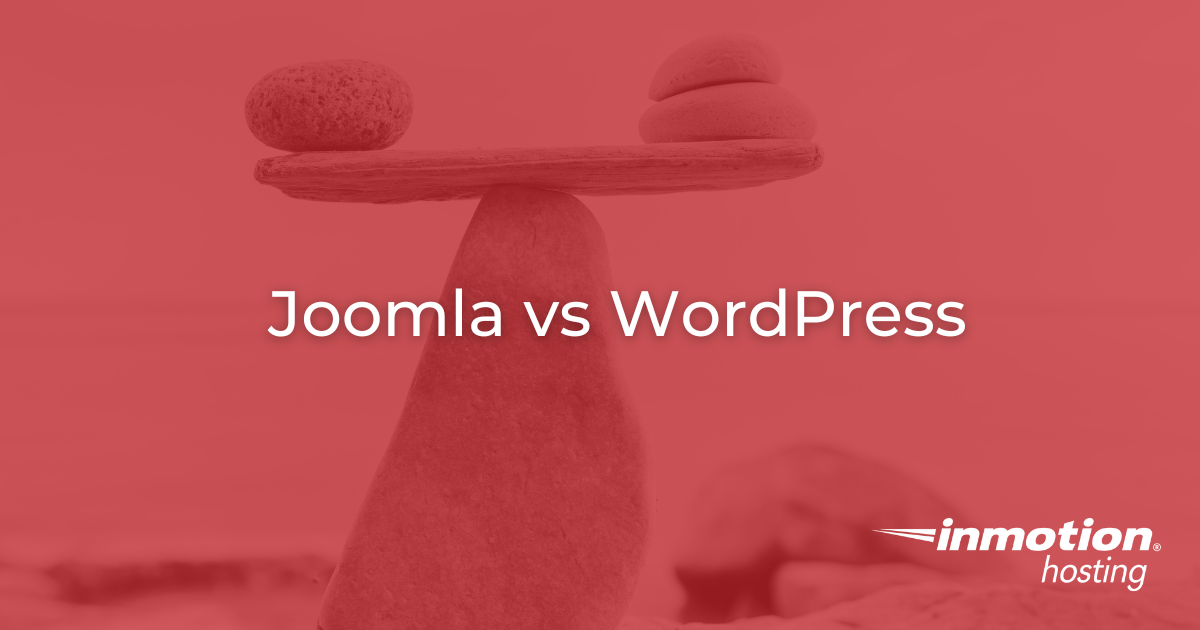
Joomla vs WordPress – CMS Comparison
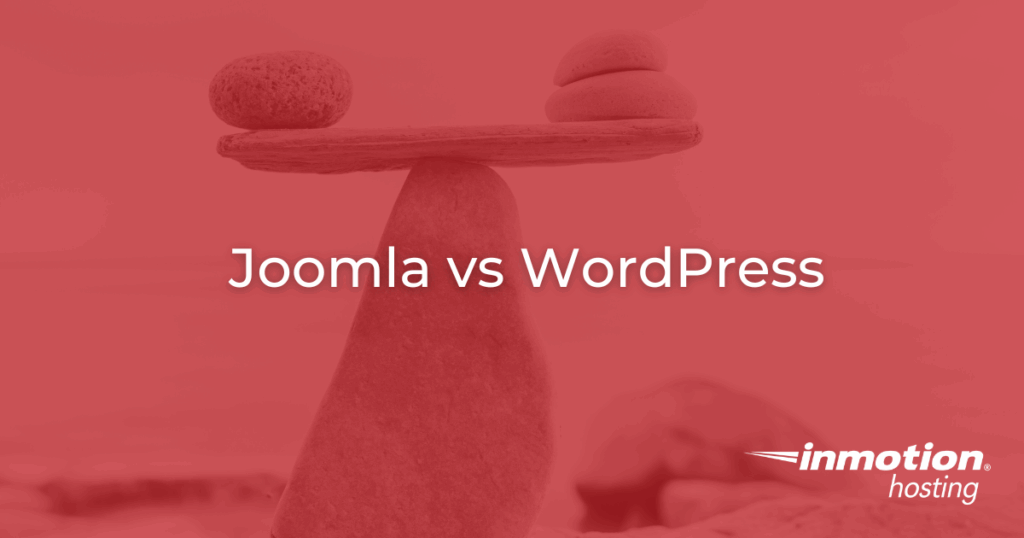
Choosing between Joomla vs WordPress comes down to your use case. WordPress is the world’s most popular CMS, known for quick setup, ease of use, and a massive plugin ecosystem. Joomla, while less common, delivers stronger built-in customization, multilingual support, and advanced role management that technical teams value. Both can be secure, scalable, and high-performing when paired with the right hosting. This guide breaks down installation, usability, customization, security, performance, SEO, community, and cost so you can select the CMS that truly fits your goals.
Choosing the right content management system (CMS) is one of the most important decisions you’ll make when building a website. The CMS you select influences how fast your site launches, how easy it is to manage, how secure it is, and whether it scales with your growth.
Two of the most established open-source platforms are WordPress and Joomla. WordPress dominates global usage, powering over 43% of all websites worldwide, while Joomla sits at around 2-3% market share. The sheer difference in adoption often leads to the obvious question: Why would anyone choose Joomla when WordPress is so popular?
The answer is that each CMS solves different problems. WordPress is designed for accessibility, speed to market, and publishing ease. Joomla, while less common, offers structure, flexibility, and control that appeal to developers and organizations with complex needs.
This article breaks down who each platform is for, explores key decision factors like security, cost, customization, performance, and ease of use, and draws on InMotion Hosting’s experience supporting both platforms. By the end, you’ll know which CMS aligns with your goals.
Before diving into the side-by-side breakdown, it helps to step back and ask the fundamental question: Who are these platforms really built for? Both Joomla and WordPress have different audiences in mind, and understanding those audiences will shape how you see the comparisons that follow. Once you know the “who,” the “why” becomes much clearer.
The Core Question: Who Are Joomla and WordPress For?
WordPress
WordPress is the go-to choice for small businesses, bloggers, agencies, and even large enterprises that need a straightforward publishing system. It has a gentle learning curve, an enormous plugin ecosystem, and a massive global community.
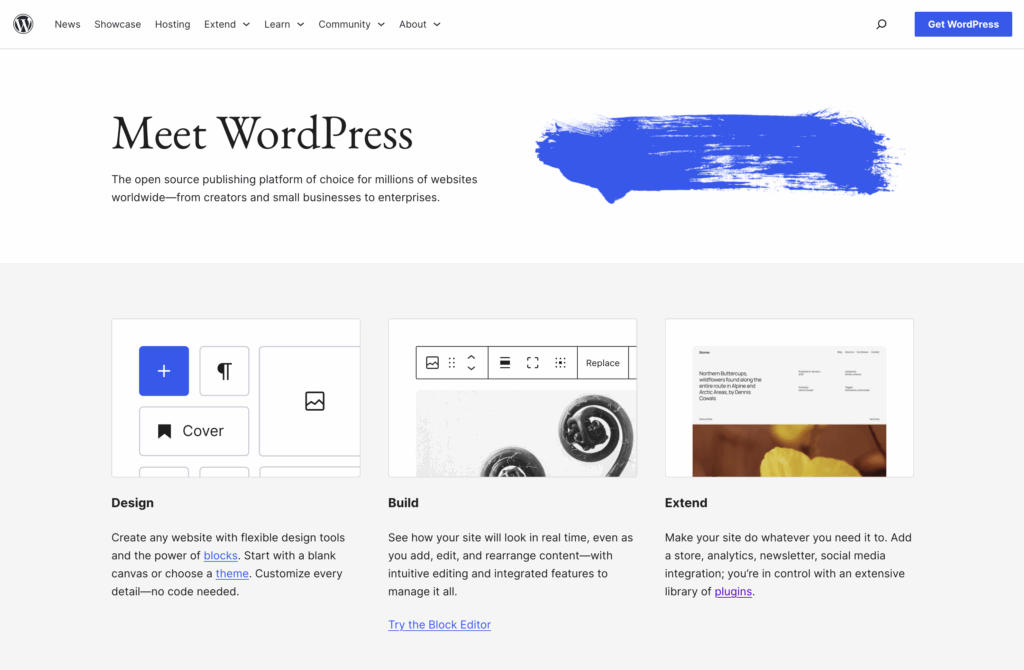
Joomla
Joomla, on the other hand, is built for those who need fine-grained control. It’s a better fit for multilingual sites, membership platforms, nonprofits, universities, and developer-led teams that want to configure everything directly rather than relying on third-party plugins.
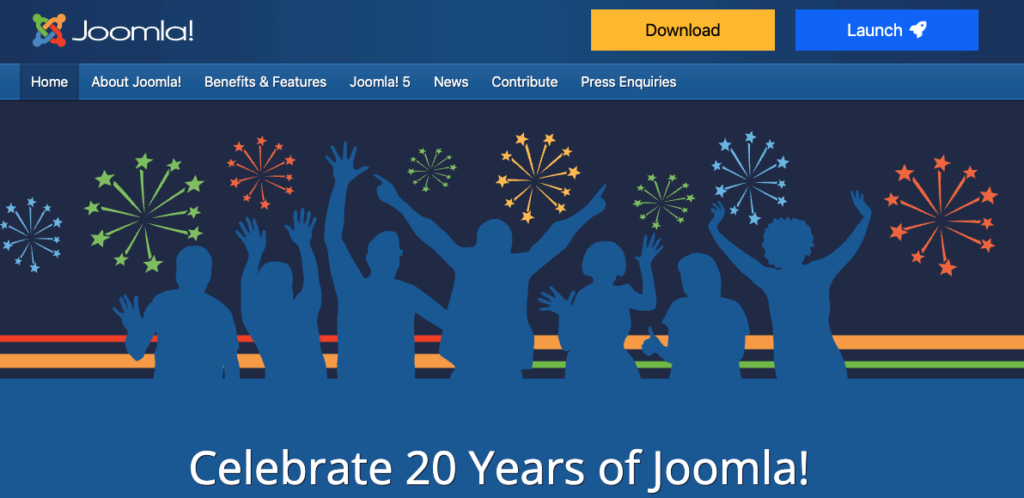
Your choice isn’t about which CMS is “better” in absolute terms. It’s about which one solves your problem.
Now that we’ve identified the audiences, the next step is to look at the decision factors that will matter most in real-world situations. A CMS is more than just software; it’s how you interact with your content every day. Let’s start at the very beginning, installing the platform.
1. Ease of Installation
One of the first hurdles for any new site owner is getting the CMS installed and running.
- WordPress: Nearly every hosting provider, including InMotion Hosting, offers one-click WordPress installation. Within minutes, you can log into your dashboard and start customizing. This simplicity is one reason WordPress powers over 500 million websites.
- Joomla: Also available via one-click installers, but setup can feel more involved. Configuring multilingual sites, user permissions, or complex menus may require additional steps.
Takeaway: If your priority is to launch quickly with minimal setup, WordPress wins. If you’re comfortable spending more time upfront to build a structured site, Joomla is manageable.
Getting your site installed is only the first step. Once it’s online, you’ll need to manage content and settings every day. That’s where ease of use comes in, and for many businesses, this factor alone can determine long-term success.
2. Ease of Use (Simplicity)
A platform’s ease of use determines how efficiently you or your team can manage daily content updates.
- WordPress: Known for its user-friendly dashboard and Gutenberg block editor. Content creators can publish blogs, add images, and optimize for SEO without technical training. Beginners often find they can get productive within a day.
- Joomla: Offers a more complex administrative interface with additional menus and configuration options. For newcomers, the terminology (“articles”, “modules”, “components”) can be confusing. But once learned, Joomla offers deeper control.
From InMotion Hosting’s “Open Source Central: Joomla 3.1 and Articles”, one important insight is that Joomla’s “articles” are essentially web pages. Once users understand the lingo, the platform starts to click. It requires a bit of patience, but it rewards those who stick with it.
Takeaway: WordPress is ideal for teams that value simplicity. Joomla demands more upfront learning but pays off with greater flexibility for advanced use cases.
Ease of use is important, but most websites eventually need features beyond the basics. That’s where customization becomes the deciding factor. The ability to tailor your site’s look, feel, and functionality separates a good CMS from a great one.
3. Customization & Flexibility
When it comes to customization, the real difference between platforms is how much flexibility you need upfront versus what you can add later. WordPress and Joomla approach this in very different ways, each with its own strengths and trade-offs.
- WordPress:
- Offers 59,000+ free plugins and thousands of themes.
- Almost any feature (eCommerce, SEO optimization, memberships) can be added with a plugin.
- The downside is “plugin bloat.” Too many plugins can conflict, slow down your site, or introduce security risks.
- Joomla:
Takeaway: WordPress wins on breadth of add-ons. Joomla wins when it comes to the depth of built-in customization. If you want quick solutions, WordPress is easier. If you prefer fine-grained control, Joomla delivers.
Customization is powerful, but it also creates risks if not handled carefully. That leads to one of the most critical concerns for any business website: security. Both Joomla and WordPress approach it differently, and it’s worth understanding those trade-offs.
4. Security
Security is one of the biggest factors in choosing a CMS, since a single breach can disrupt business and damage trust. WordPress and Joomla both provide solid foundations, but their risk profiles differ based on how extensions and configurations are managed.
- WordPress:
- Joomla:
- Strong built-in access control system.
- Fewer extensions mean fewer third-party risks, but some studies have found vulnerabilities in top Joomla extensions, including cross-site scripting (XSS) and SQL injection risks.
Takeaway: Both platforms can be secure, but both require active management. WordPress demands more vigilance with plugin hygiene. Joomla requires careful selection of extensions. In both cases, hosting with real human support and advanced protections is critical.
Even if your site is secure, it won’t succeed if it’s slow. Performance directly affects search rankings, user experience, and conversion rates. Let’s see how Joomla and WordPress compare when it comes to speed and scalability.
5. Performance
Performance is more than just how fast a page loads; it’s about how well a CMS works with the infrastructure behind it. The way WordPress and Joomla handle speed, scalability, and efficiency depends heavily on the hosting environment you choose.
A CMS is only as fast as its hosting infrastructure.
- WordPress: With NVMe-powered hosting, caching, and CDN integration, WordPress can scale from a simple blog to an enterprise site with millions of visits. But poorly optimized plugins can drag performance down.
- Joomla: Its lightweight core gives it an edge in raw efficiency. For large, structured sites, it can be more performant if configured correctly.
Takeaway: Performance isn’t dictated by CMS choice alone. Infrastructure matters more. Both Joomla and WordPress thrive when paired with NVMe storage, scalable architecture, and proactive support.
Once you’ve addressed performance, the next natural question is cost. While both CMS platforms are open-source and free, the real costs show up in hosting, development time, and add-ons. Let’s break that down.
InMotion Hosting offers hosting environments tailored to deliver excellent performance when paired with WordPress. Check out our WordPress-focused hosting plans linked here.
6. Cost of Ownership
Both Joomla and WordPress are free, open-source platforms. Costs come from hosting, premium add-ons, and developer time.
- WordPress: Lower entry cost. Many free plugins/themes. However, managing plugin bloat or hiring developers for troubleshooting can add up.
- Joomla: Fewer extension costs, but higher developer time due to complexity.
Takeaway: WordPress generally costs less for small businesses and startups. Joomla can cost more upfront, but it saves money in the long run for projects that require structure and fewer third-party dependencies.
Cost is a deciding factor, but visibility is equally critical. A CMS that makes SEO difficult will hold your business back. Both WordPress and Joomla offer strong capabilities here, but they take different approaches.
7. SEO Capabilities
Search visibility can make or break the success of a site, and a CMS plays a key role in how easily your content gets discovered. WordPress and Joomla both offer solid SEO foundations, but they take different paths to get there.
- WordPress: SEO-friendly out of the box, and plugins like Yoast SEO or Rank Math make optimization straightforward even for beginners.
- Joomla: Offers strong SEO settings natively but requires more manual setup. Metadata, breadcrumbs, and URL rewriting can be configured in detail.
Takeaway: WordPress is beginner-friendly for SEO. Joomla is equally capable in the hands of technical teams.
Even the best CMS can’t do everything alone. The size and activity of a platform’s community can determine how easily you find help, hire talent, or troubleshoot issues. That makes community support another essential factor.
A CMS is easier to master when you can tap into the right knowledge base and support network. WordPress and Joomla both have active communities, but they differ in size, focus, and the kind of help you’ll find.
- WordPress: Largest CMS community in the world. Tutorials, agencies, freelancers, and documentation are everywhere.
- Joomla: Smaller but highly technical community. Documentation and forums are strong, but fewer generalist resources.
Takeaway: WordPress offers very extensive community support. Joomla offers depth of technical support.
By now, we’ve compared the platforms across the most important decision factors. But theory only goes so far; real-world use cases show where each CMS shines. Let’s look at how different businesses and organizations might choose one over the other.
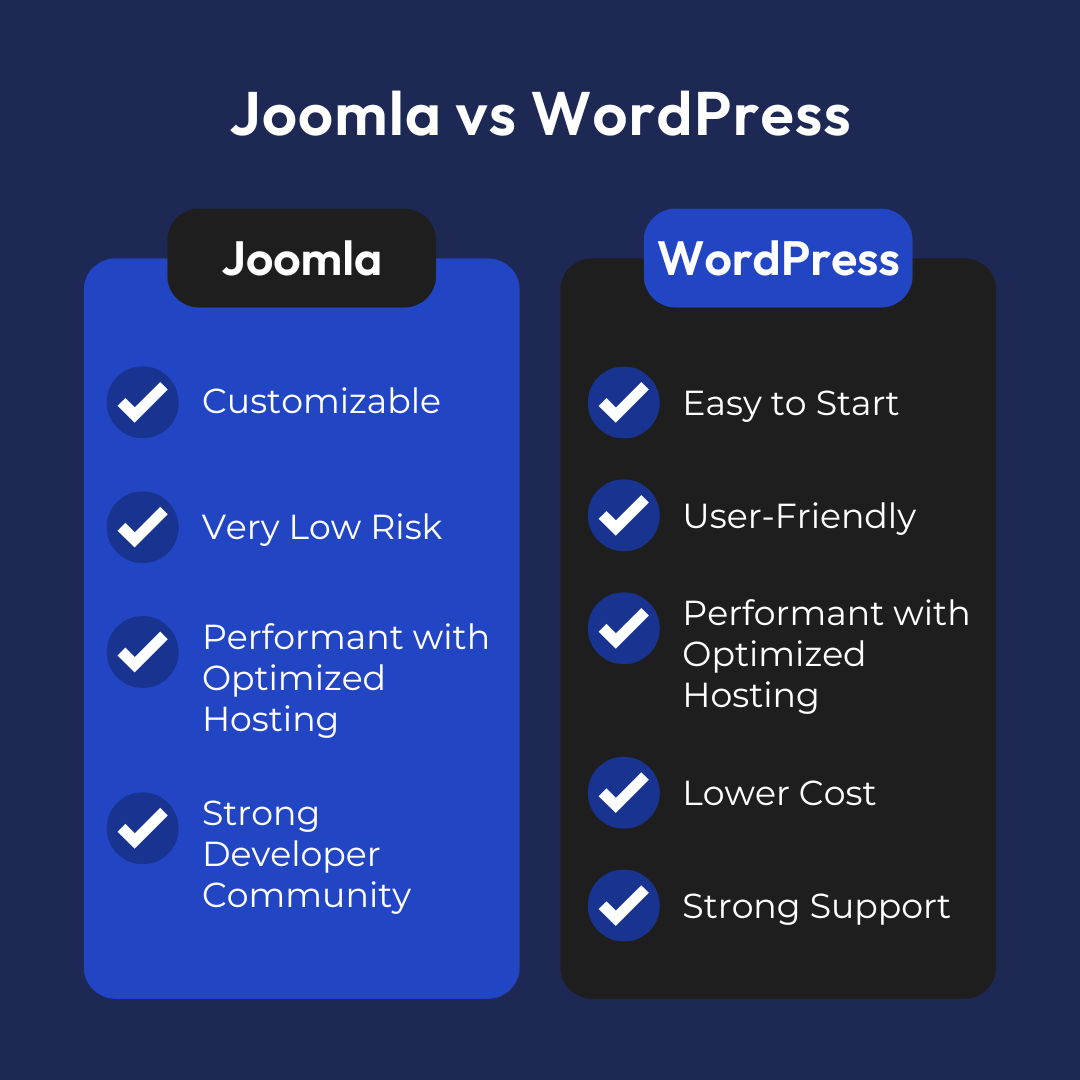
Real-World Use Cases
When WordPress Shines
- Content-Driven Sites: Blogs, news outlets, and marketing websites.
- Small Businesses and Startups: Quick to launch, lower costs.
- eCommerce: WooCommerce dominates the online store market.
- Agencies: Easy handoff to non-technical clients.
When Joomla Shines
- Multilingual Organizations: Built-in support makes it ideal for global nonprofits or corporations.
- Membership or Community Portals: Strong user permissions make it powerful for universities or associations.
- Complex Information Structures: Governments, healthcare providers, and nonprofits managing multiple content types.
- Developer-Led Teams: Technical teams that prefer hands-on control.
Joomla excels when you want to “do more with less,” like customizing layouts without relying on dozens of third-party plugins, for instance.
Real-world use cases give us practical insight, but sometimes a direct comparison table makes things even clearer. Here’s a side-by-side view of how each CMS addresses specific business problems.
Side-by-Side: Problem to Solution With Joomla vs WordPress
| Business Need / Problem | WordPress Solution | Joomla Solution |
|---|---|---|
| Quick installation | One-click install, ready in minutes | One-click install, more setup options |
| Publish content quickly | Intuitive block editor, SEO plugins | Structured system, more steps |
| Manage a multilingual site | Requires plugins | Built-in multilingual support |
| Build an online store | WooCommerce ecosystem | J2Store, a smaller ecosystem |
| Community portal | Plugins are available, but heavy | Native role-based permissions |
| Scale to enterprise traffic | Needs caching + NVMe hosting | Strong with dev tuning + hosting |
| Customization | Plugins and themes galore | Core features + focused extensions |
Tables and comparisons are useful, but success ultimately comes down to how your site is hosted and supported. Let’s step back from the CMS itself and look at the role of infrastructure in ensuring performance, security, and scalability.
Performance, Security, and Hosting Considerations
No CMS succeeds without a strong foundation. At InMotion Hosting, we’ve seen both Joomla and WordPress sites underperform when hosted on outdated or underpowered servers. Conversely, both platforms thrive when powered by:
- NVMe storage delivers millisecond content delivery.
- Advanced caching to serve high-traffic sites.
- Scalability that grows with your business.
- 24/7 human support to troubleshoot critical issues.
This reflects our brand pillars: engineered speed, growth without limits, accountability you can trust, and real human support.
After reviewing all these angles, it’s clear that the “better” CMS depends entirely on your use case. But to make the choice easier, let’s build a decision guide you can follow step by step.
Decision Guide: How To Choose
- Define Your Primary Use Case
- Content publishing? WordPress.
- Multilingual community portal? Joomla.
- Match Against Decision Factors
- Need simplicity? WordPress.
- Need structure and permissions? Joomla.
- Confirm Your Hosting Foundation
- Both need high-performance hosting to reach full potential.
Quick Checklist:
- Are you a beginner? WordPress.
- Do you want built-in multilingual support? Joomla.
- Do you need fast publishing tools? WordPress.
- Do you need complex role management? Joomla.
At this point, the choice between Joomla and WordPress should feel more practical and less abstract. You’ve seen the strengths, weaknesses, and real-world examples. What remains is a simple recap of when to choose each one.
Conclusion
The debate isn’t about which CMS is “better.” It’s about which CMS is right for you.
- WordPress is ideal for those who want simplicity, quick deployment, and access to the largest ecosystem of plugins and themes.
- Joomla is the choice for organizations that need structure, multilingual support, and developer-level control without relying heavily on third-party plugins.
In both cases, your CMS is only as strong as the hosting foundation behind it. With high-performance infrastructure, scalability, and reliable human support, InMotion Hosting allows you to grow confidently, whether you choose WordPress or Joomla.
Power Your Growth with Managed WordPress
Unlock the full potential of your mission-critical WordPress site with scalable, purpose-built servers. Give your website the performance, security, and support it needs to succeed – so you can focus on growing your business.
Scalable Cloud Servers
Advanced Security
Managed Updates
Expert Support
Managed WordPress Hosting







